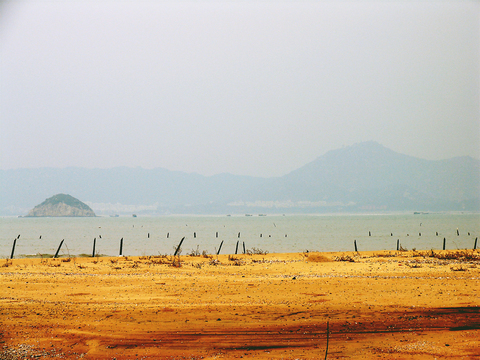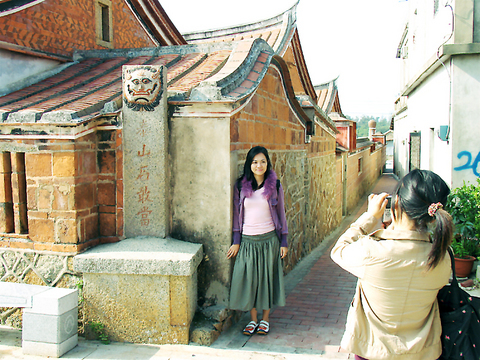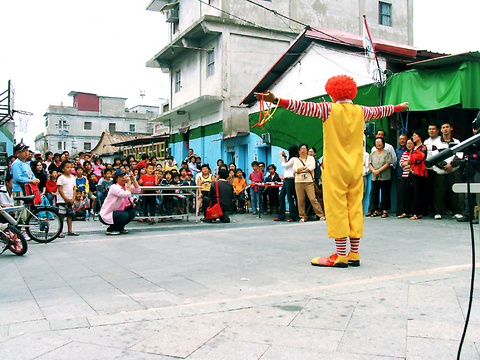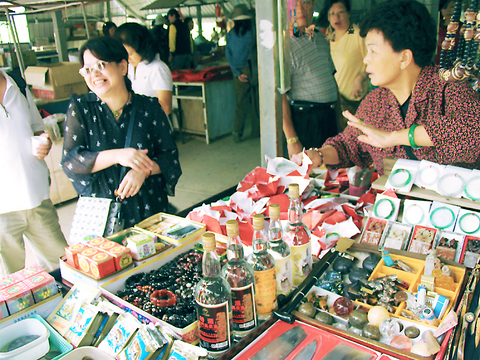The great-crested grebes are flocking to Kinmen. Rarely seen in other parts of Taiwan, they fly to the nation's westernmost archipelago from central and northern China to enjoy the islands' drier, more temperate winter climate. Together with great cormorants and lesser-pied kingfishers, they come in the thousands.
While the residents of Kinmen are happy to host their yearly visitors, they've lately been pining to be paid a visit by a different species of guest from China: the tourist.
Unfortunately, the windfall of Chinese visitors originally expected from the opening of postal, transport and travel links with China's Fujian province has failed to materialize.

PHOTO: DAVID MOMPHARD, TAIPEI TIMES
Politicians point to problems in policy that have hobbled the development of the island's tourism industry, but local business leaders say economic factors are also to blame.
Although Taiwan opened its doors to visitors from the mainland via the "three small links" in January 2001, the government in Beijing did not allow its citizens to take advantage of the travel links until September last year, when Fujian Province Deputy Governor Wang Meixiang (
Previously, only politicians and businessmen were allowed to travel to Taiwan's Kinmen and Matsu islands to facilitate the part of the three links China was taking full advantage of, the transport of Chinese goods to the islands.

PHOTO: DAVID MOMPHARD, TAIPEI TIMES
Over 15,000 port calls have been made in Kinmen and Matsu since 2001, with 55 percent being Chinese cargo ships. Of the 2.3 million tonnes of products handled at Kinmen's Shuitou Port since 2001, 2.2 million were imports from China.
The remaining 1 percent was mostly Kinmen's famous Kaoliang liquor being shipped to the Chinese ports of Mawei and Xiamen, the latter of which is a mere 2km from Kinmen.
Of the 951,000 passengers who have made the journey between the two nations, 94 percent were China-bound Taiwanese. Residents of Kinmen and Matzu have bought some 4,000 houses in Xiamen and spent nearly NT$3 billion.

PHOTO: DAVID MOMPHARD, TAIPEI TIMES
"The opening of these transportation and travel links were supposed to be a boon for our businesses," said Kinmen County Commissioner Lee Chu-feng
"A year ago our township heads were clamoring to attract hotel and resort developers. When the first group of mainland tourists came in December of last year we met them at the airport with banners and flowers. And since then, only 2,000 have come. There were 10 million people from all parts of China that visited Xiamen last year and only 2,000 of them made the half-hour boat ride to Kinmen."
Instead, Lee and others said, the three small links have been a boon for Taiwanese businessmen who operate in China. Since 2001, Kinmen's population has grown from 50,000 to 60,000. The influx is due to Taiwanese businessmen who have switched their household registrations from Taiwan proper to Kinmen in order to take advantage of travel links.

PHOTO: DAVID MOMPHARD, TAIPEI TIMES
An alternative route
After having been registered for six months, new residents can apply for a permit that allows them to board boats bound for Fujian Province. On the other side, they are issued five-year permits allowing them to board boats to return to Kinmen, where they can fly inexpensively to their actual homes on Taiwan proper.
"With my factory located in Fujian, it's cheaper for me to travel via Xiamen and Kinmen than to have to go through Hong Kong," said Wu Ching-chung (
Locals complain that these taishang (
"They get off the plane at the airport and take a bus to Shuitou Harbor and they're gone," said one local restaurant owner. "They don't stop for a meal because they're afraid of getting sea sick. And when they come back through they don't eat because they've got a plane to catch!"
Kinmen County Legislator Wu Cheng-tian (
"The airlines that operate flights to Kinmen used to offer discounts to attract more tourists," he said. "Now all the flights are taken up by taishang and the airlines don't feel a need to offer discounts. As a result, there are fewer actual tourists coming."
Kinmen's two main islands have enjoyed a steady stream of visitors from Taiwan since martial law ended in 1992. A more recent demilitarization has brought an even larger influx of tourists wanting to crawl into abandoned bunkers, traipse through the several kilometers of tunnels burrowed into the island and gawk at the giant megaphones once used to broadcast propaganda to China.
Huge swaths of land remain mined, but the government is working to clear these to make way for development.
The problem is that the ferries returning to Kinmen from Fujian were supposed to be filled with China tourists, themselves curious to get a closer look at the island on which, in 1958, they'd dropped half a million bombs.
When the Taiwanese government capped the number of visitors at 600 per day (each was allowed to stay a maximum of three days and two nights) Kinmen officials protested. Though the cap remains it has come to naught; the number of Chinese visiting the island in a single day has yet to come close to that number, according to Lee and local tourism officials.
The reason is two-fold: an added layer of red tape on the Chinese side and an economic disincentive. For residents of Fujian to come to Kinmen or Matsu, they need to start their application procedure seven to 10 days in advance, provide all the pertinent paperwork, and often return to the application office more than once. There are too many hoops to jump through for the causal visitor.
What's more, tour packages are priced at around NT$3,500 for three days and two nights, about the same as the average monthly salary for residents of Fuzhou, the seat of Fujian province. For those who can afford it, a trip to Hong Kong costs about the same, but involves far less hassle.
The tour packages are what's known as zero-dollar tours, meaning the travel agencies booking tours don't make money off the package itself, but earn a commission from sales at the various places they take the tour groups; restaurants and the several novelty boutiques unique to Kinmen. But even here, according to local tourism officials, there is little money to be made.
"If you're [in Kinmen] long enough, you discover that everything has three prices: one for locals, one for guests from Taiwan and one for guests from China," said chief of the Kinmen County Culture Affairs Bureau, Lee Hsi-rong (
Betting on the future
One potential fix to the problem favored by a majority of residents is gambling. In May of this year, Premier Frank Hsieh
"The people of Kinmen are literally stuck in the middle," Lee said, adding that he wishes the island could have a greater say in its own future beyond what the government allows.
But not everyone is unhappy with the current situation and these people say living standards have improved drastically since the days when Kinmen was a fortified bunker and the closest target for aggression from China.
"All you hear about is how businessmen in Kinmen can't make money," said a life-long resident who gave his name as Huang. "But life here is better than it has ever been and they're still richer than businessmen in Fujian."
He mentioned the birds that every year fly from China to Kinmen's wetlands and the fact that this, as last year, they bring with them the specter of avian flu. "If a disease like that came to Kinmen it would ruin us economically if it didn't kill us. People think that if weren't for politics we could be a lot closer to China, but I think there is more than one reason to keep our distance."

Dissident artist Ai Weiwei’s (艾未未) famous return to the People’s Republic of China (PRC) has been overshadowed by the astonishing news of the latest arrests of senior military figures for “corruption,” but it is an interesting piece of news in its own right, though more for what Ai does not understand than for what he does. Ai simply lacks the reflective understanding that the loneliness and isolation he imagines are “European” are simply the joys of life as an expat. That goes both ways: “I love Taiwan!” say many still wet-behind-the-ears expats here, not realizing what they love is being an

Every now and then, even hardcore hikers like to sleep in, leave the heavy gear at home and just enjoy a relaxed half-day stroll in the mountains: no cold, no steep uphills, no pressure to walk a certain distance in a day. In the winter, the mild climate and lower elevations of the forests in Taiwan’s far south offer a number of easy escapes like this. A prime example is the river above Mudan Reservoir (牡丹水庫): with shallow water, gentle current, abundant wildlife and a complete lack of tourists, this walk is accessible to nearly everyone but still feels quite remote.

Google unveiled an artificial intelligence tool Wednesday that its scientists said would help unravel the mysteries of the human genome — and could one day lead to new treatments for diseases. The deep learning model AlphaGenome was hailed by outside researchers as a “breakthrough” that would let scientists study and even simulate the roots of difficult-to-treat genetic diseases. While the first complete map of the human genome in 2003 “gave us the book of life, reading it remained a challenge,” Pushmeet Kohli, vice president of research at Google DeepMind, told journalists. “We have the text,” he said, which is a sequence of

It’s a bold filmmaking choice to have a countdown clock on the screen for most of your movie. In the best-case scenario for a movie like Mercy, in which a Los Angeles detective has to prove his innocence to an artificial intelligence judge within said time limit, it heightens the tension. Who hasn’t gotten sweaty palms in, say, a Mission: Impossible movie when the bomb is ticking down and Tom Cruise still hasn’t cleared the building? Why not just extend it for the duration? Perhaps in a better movie it might have worked. Sadly in Mercy, it’s an ever-present reminder of just